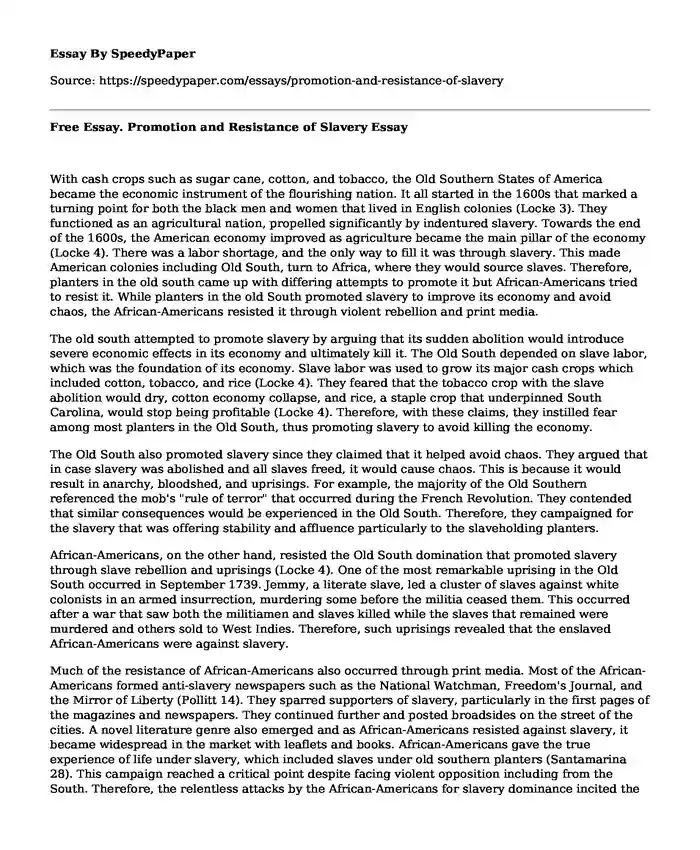
| Type of paper: | Essay |
| Categories: | Slavery Agriculture American history |
| Pages: | 3 |
| Wordcount: | 747 words |
With cash crops such as sugar cane, cotton, and tobacco, the Old Southern States of America became the economic instrument of the flourishing nation. It all started in the 1600s that marked a turning point for both the black men and women that lived in English colonies (Locke 3). They functioned as an agricultural nation, propelled significantly by indentured slavery. Towards the end of the 1600s, the American economy improved as agriculture became the main pillar of the economy (Locke 4). There was a labor shortage, and the only way to fill it was through slavery. This made American colonies including Old South, turn to Africa, where they would source slaves. Therefore, planters in the old south came up with differing attempts to promote it but African-Americans tried to resist it. While planters in the old South promoted slavery to improve its economy and avoid chaos, the African-Americans resisted it through violent rebellion and print media.
The old south attempted to promote slavery by arguing that its sudden abolition would introduce severe economic effects in its economy and ultimately kill it. The Old South depended on slave labor, which was the foundation of its economy. Slave labor was used to grow its major cash crops which included cotton, tobacco, and rice (Locke 4). They feared that the tobacco crop with the slave abolition would dry, cotton economy collapse, and rice, a staple crop that underpinned South Carolina, would stop being profitable (Locke 4). Therefore, with these claims, they instilled fear among most planters in the Old South, thus promoting slavery to avoid killing the economy.
The Old South also promoted slavery since they claimed that it helped avoid chaos. They argued that in case slavery was abolished and all slaves freed, it would cause chaos. This is because it would result in anarchy, bloodshed, and uprisings. For example, the majority of the Old Southern referenced the mob's "rule of terror" that occurred during the French Revolution. They contended that similar consequences would be experienced in the Old South. Therefore, they campaigned for the slavery that was offering stability and affluence particularly to the slaveholding planters.
African-Americans, on the other hand, resisted the Old South domination that promoted slavery through slave rebellion and uprisings (Locke 4). One of the most remarkable uprising in the Old South occurred in September 1739. Jemmy, a literate slave, led a cluster of slaves against white colonists in an armed insurrection, murdering some before the militia ceased them. This occurred after a war that saw both the militiamen and slaves killed while the slaves that remained were murdered and others sold to West Indies. Therefore, such uprisings revealed that the enslaved African-Americans were against slavery.
Much of the resistance of African-Americans also occurred through print media. Most of the African-Americans formed anti-slavery newspapers such as the National Watchman, Freedom's Journal, and the Mirror of Liberty (Pollitt 14). They sparred supporters of slavery, particularly in the first pages of the magazines and newspapers. They continued further and posted broadsides on the street of the cities. A novel literature genre also emerged and as African-Americans resisted against slavery, it became widespread in the market with leaflets and books. African-Americans gave the true experience of life under slavery, which included slaves under old southern planters (Santamarina 28). This campaign reached a critical point despite facing violent opposition including from the South. Therefore, the relentless attacks by the African-Americans for slavery dominance incited the planters' viewpoint in the Old South, which guaranteed that the subject of slavery would ultimately be made via an open war (Locke 4).
The promotion and resistance of slavery in the Old South were as a result of differing importance attached to it by both the planters and African-Americans. Planters promoted it since it enhanced their economy and to avoid chaos from freed slaves. African-Americans, on the other hand, resisted slavery through uprisings and print. Therefore, while the issue of slavery seemed to cause instability in the Old South, it would be essential if both sides sat and discussed how to solve it rather than deciding it through an open war.
Works Cited
Locke, Joseph L., and Ben Wright, eds. The American Yawp: A Massively Collaborative Open US History Textbook, Vol. 1: To 1877. Stanford University Press, 2019. ISBN-13: 978-1503606715
Pollitt, Bethany Marie. "The Antislavery Movement in Clermont County."2012. Retrieved from https://corescholar.libraries.wright.edu/cgi/viewcontent.cgi?article=1710&context=etd_all
Santamarina, Xiomara. "Fugitive Slave, Fugitive Novelist: The Narrative of James Williams (1838)." American Literary History 31.1,2019.p-24-46. https://doi.org/10.1093/alh/ajy051
Cite this page
Free Essay. Promotion and Resistance of Slavery. (2023, Mar 15). Retrieved from https://speedypaper.com/essays/promotion-and-resistance-of-slavery
Request Removal
If you are the original author of this essay and no longer wish to have it published on the SpeedyPaper website, please click below to request its removal:
- Semblance Essay Example
- Implicit Theories and Their Role in Judgement and Reactions, Free Essay on the Article
- Communication Tools for EOL Decision-Making, Free Essay Sample
- War or Autocracy - The Fall of the Russian Empire. Essay Example
- Free Essay: Components of the Client Acceptance and Engagement Letters for an Audit
- [DataSet1] C:\Users\CADTech\Downloads\New folder\Santa Fe Grill - SPSS Data Set.savStatistics
- Why Is the Black Race Impoverished? Essay Example
Popular categories




